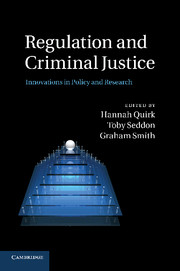Book contents
- Frontmatter
- Contents
- List of figures and tables
- Notes on contributors
- Foreword
- Acknowledgements
- 1 Regulation and criminal justice: exploring the connections and disconnections
- PART I Regulation and criminal justice: framing the debate
- PART II Criminal justice as regulation: responsivity, alternatives and expansion
- PART III Regulation of criminal justice: monitoring, effectiveness and accountability
- 10 The regulation of criminal justice: inspectorates, ombudsmen and inquiries
- 11 Rethinking prison inspection: regulating institutions of confinement
- 12 Regulating democracy: justice, citizenship and inequality in Brazil
- Index
- References
12 - Regulating democracy: justice, citizenship and inequality in Brazil
Published online by Cambridge University Press: 04 February 2011
- Frontmatter
- Contents
- List of figures and tables
- Notes on contributors
- Foreword
- Acknowledgements
- 1 Regulation and criminal justice: exploring the connections and disconnections
- PART I Regulation and criminal justice: framing the debate
- PART II Criminal justice as regulation: responsivity, alternatives and expansion
- PART III Regulation of criminal justice: monitoring, effectiveness and accountability
- 10 The regulation of criminal justice: inspectorates, ombudsmen and inquiries
- 11 Rethinking prison inspection: regulating institutions of confinement
- 12 Regulating democracy: justice, citizenship and inequality in Brazil
- Index
- References
Summary
Introduction
My paper for the Manchester ESRC Seminar Series, Regulation and Criminal Justice, was part of the session on ‘responsivity’. ‘Responsivity’ has many connotations, but in this chapter I am concerned with the issue of responsiveness to diversity and division. Systems of criminal justice and regulation are increasingly called upon to recognize the claims to inclusion of the formerly excluded or marginalized, and to respond to conflicts and harms involving persons whose perspectives may be so different as to appear irreconcilable. Theories put forward to deal with these demands include deliberative democracy and cosmopolitan justice. The idea common to both is that of discourse: response to diversity, division and difference in perspectives demands greater openness of discourse than is found in established formal justice proceedings. Participants should be able to present their claims, their harms and the circumstances of their transgressions in their own words.
The idea of ‘responsive regulation’ is particularly associated with John Braithwaite, and responsivity is at the heart of the restorative justice paradigm he advocates (Braithwaite 2002). In this model, justice processes should respond to harms, disruptions, wrongs discursively: they should define the problem they are dealing with in terms of its effects on victims, offenders and the community, and process participants must seek solutions appropriate to all parties rather than fitting the problem into pre-existing legal categories and applying the relevant rules and precedents.
- Type
- Chapter
- Information
- Regulation and Criminal JusticeInnovations in Policy and Research, pp. 283 - 305Publisher: Cambridge University PressPrint publication year: 2010
References
- 1
- Cited by



